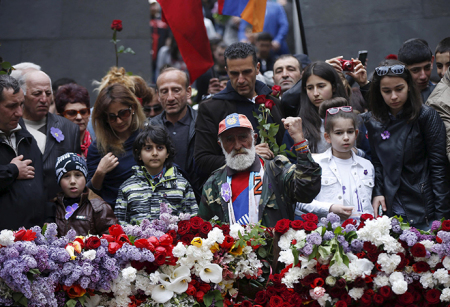World Marks 100th Anniversary of Genocide of 1.5 Million Armenians, One of the Largest Christian Genocides in History

World and faith leaders are marking on Friday the 100th year anniversary of the genocide of 1.5 million Armenians at the hands of the Ottoman Empire, one of the largest Christian massacres in history.
"I am grateful to all those who are here to once again confirm your commitment to human values, to say that nothing is forgotten, that after 100 years we remember," Armenian President Serzh Sargsyan said at a flower-laying ceremony in Yerevan.
BBC News reported that French President Francois Hollande and Russian President Vladimir Putin also attended the same ceremony, and paid their respects to those that were killed.
Hollande said: "I bow down in memory of the victims and I come to tell my Armenian friends that we will never forget the tragedies that your people has endured."
He added that "recognition of the Armenian genocide is an act of peace," and denounced the repression of ethnic minorities and religiously motivated killings anywhere in the world.
Putin insisted that "there cannot be any justification for mass murder of people."
The Russian President added: "We sincerely sympathize with the Armenian people who suffered one of the most awful tragedies in the history of mankind."

Armenia and most western scholars maintain that close to 1.5 million people, mostly Armenian Christians, were killed by starvation, deportation, and other means in 1915 in the twilight years of the Ottoman Empire.
Turkey, which formed following the Ottoman disintegration, has strongly objected to the killings being described as a "genocide," and has claimed that the number of deaths was much smaller.
Turkish Prime Minister Ahmet Davutoglu has said that his country will also "share the pain" with Armenians in its own memorial service, but affirmed his objection to the killings being described as a genocide.
The term has brought great controversy, with Armenian-American activists expressing their outrage with U.S. President Barack Obama earlier this week after he backed out of a promise to refer to the 1915 massacre as a genocide.
"The president's surrender represents a national disgrace," said Aram S. Hamparian, executive director of the Washington-based Armenian National Committee of America. "It is a betrayal of the truth, and it is a betrayal of trust."
Obama had promised during his election campaign in 2008 that he would not shy away from using the word, but now the White House has said that it does not want to sour its relations with Turkey, a NATO-partner.
Last week Pope Francis said at the Vatican that the Armenian victims of 1915 were slaughtered because of their faith, and called the events a "genocide." This promoted anger from Turkey, which recalled its ambassador to the Holy See.
The Telegraph reported that the Armenian Church held one of the biggest canonization services in history outside Armenia's main cathedral at Echmiadzin, where it honored the 1.5 million victims.
"During the dire years of the genocide of the Armenians, millions of our people were uprooted and massacred in a premeditated manner, passed through fire and sword, tasted the bitter fruits of torture and sorrow," said Karekin II, the head of the Armenian Apostolic Church.
"The canonization of the martyrs of the genocide brings life-giving new breath, grace and blessing to our national and ecclesiastical life."
Gabriel Quicke, who heads the Vatican's desk for Oriental Orthodox relations at the Council for Christian Unity, also attended the national genocide ceremony in Yerevan on Friday.
"The history of the Armenian people is the story of a journey, as they are like Abraham, always travelling from place to place, but also witnesses to the terrible atrocities of a century ago," he said, according to Vatican Radio.
Quicke added that he was "happily surprised" to hear Francis use the word "genocide" earlier this month, and pointed out that this was the first time a pope had publicly used the term to describe the 1915 slaughter of Armenian Christians.






















